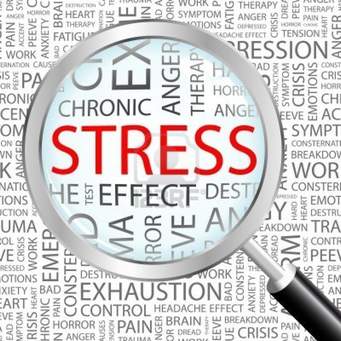Stress is defined as an uncomfortable psychological feeling in response to good and bad events in life. So it is not always a bad emotional feeling. A little bit of it actually help us perform better. It helps people to tide over tough situations, take tough decisions, sharpens the intellect. But constantly being in top gear is detrimental to wellbeing.
Stress has been linked to numerous diseases like heart attacks, stroke, obesity, depression, cancers, immune suppression, vulnerability to infections, autoimmune diseases like rheumatoid arthritis, gastritis, peptic ulcers etc
The signs and symptoms of stress are due to the mediators released. There is a spectrum of manifestations of stress- headache, muscle spasms, giddiness, panic attacks, heartburn, indigestion, anger, frustration, mood swings, chest pain, fatigue etc
Any event or stressor releases a volley of mediators or chemicals that are responsible for the adverse effects of stress. This effect is called the flight or fight reaction and is primarily caused by glucocorticoids and catecholamines. The pituitary gland releases the adrenocorticotropic hormone which stimulates the adrenal cortex to release glucocorticoids which is the primary mediator of stress in addition to adrenaline. There are other mediators also which are inflammatory. All these together cause certain physiological changes which go by the name “stress adaptations”.
When there is an untoward occurrence, the body adapts by releasing cortisol which increases the heart rate and blood pressure and gives the thrust to cope up with the situation. Over time if the same situation prevails this leads to wear and tear of the cardiovascular system leading to heart attacks and strokes.
The central organ that decides what is a stressor and what is not, is the brain. It also decides the adaptive behavioral and psychological changes as a consequence of stress. It also takes the brunt of the injury caused due to stress. Chronic stress leads to remodeling of the brain tissue and certain areas actually shrink with repeated attacks of stress and depression leading to long lasting psychological problems. This is also a metabolic disorder leading to poor glucose control and type 2 diabetes. There is cognitive impairment due to the shrinking of the brain tissue. Loss of memory has been reported
Different people react to chronic stressors in different ways. Their early life experiences and environment to a large extent decides how a person is going to react to untoward life situations. For example uncaring families or lack of maternal care may leave an indelible mark in the psyche of the child. Another important deciding factor is genetic differences, certain variants predispose to psychological problems like depression.
People talk of being stressed out – by this they mean that their body is reacting to the stressors and it is manifesting as loss of normal sleep pattern, loss of sexual drive, addiction to alcohol, anger, smoking, doing drugs etc. People who are stressed out cannot concentrate on their work which reflects as reduced effeciency and reduced work output. A stressed individual finds it difficult to maintain personal relationships and they often fail, which stresses them further.In their workplace, they are often angry, rude and not able to work together as a group. In the homefront also the relationship with spouse and children suffer. Stress is a vicious cycle which dampens the individual’s progress and the cycle has to blocked at some point.
A positive attitude and self esteem helps people come out of difficult situations. At these times the social circle is the cornerstone, to pep up and motivate and get them out of the acute depressive phase. Chronic stressors are common in day to day life. Coping methods are taught to individuals because it is just impossible not to be stressed . The easiest and the most widely studied and research proven is exercise. There is proof that there are neuronal changes that prevent depression and delay onset of Alzheimer’s and much more. The second method of coping is meditation that focuses on breathing in a relaxed and invigorating environment. The third is by practicing yoga or taichi, which have been proven to relieve stress. The fourth and most important is to leave behind the stressful atmosphere or person and opt for a change. There are medications available for sleep disorders and depression which may or may not be habit forming. These should be the last resort.
Other tough decisions would be to switch off all electronic appliances like mobile phones and computers. Laughter therapy is a malady for many ills, hence it would be a wise decision to be part of a group that makes laughter a habit. Eating dark chocolate and including inositol in diet have also been shown to relieve stress. Listening to music and reading books have a destressing effect. Spending time with nature and pets is proven to be destressing. If the effects of stress is very bothersome, it is good to ask for help. It is very important to reach out at the right time.
Stress is a lifestyle disease and we cannot do away with it . Learning coping methods is the best way out.

